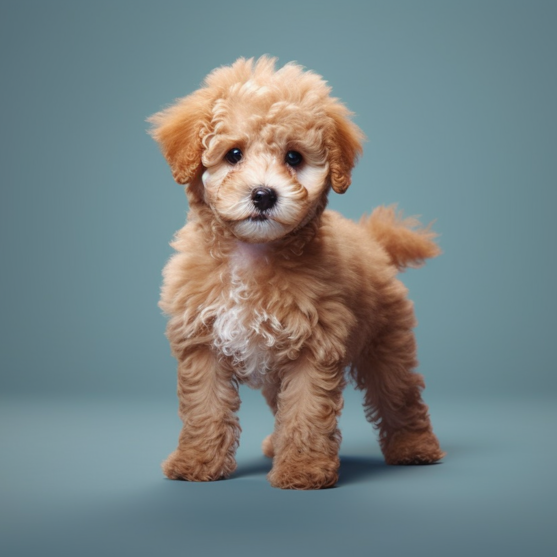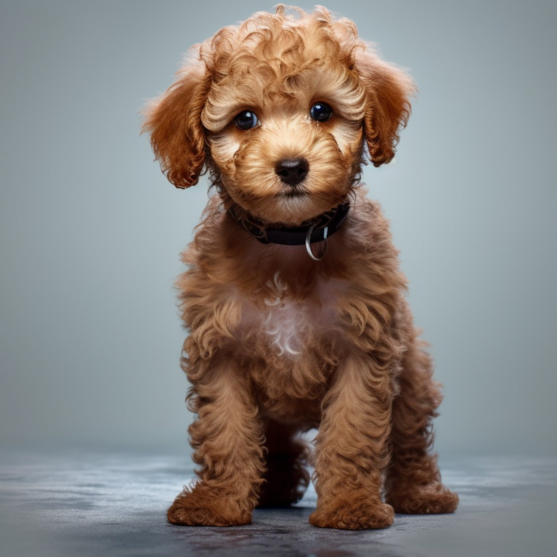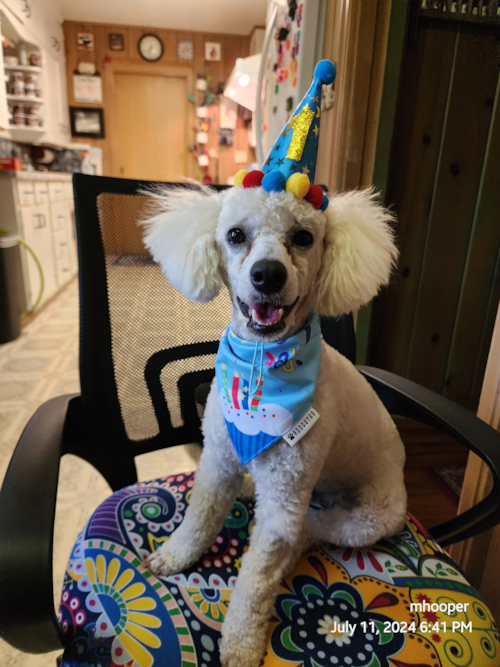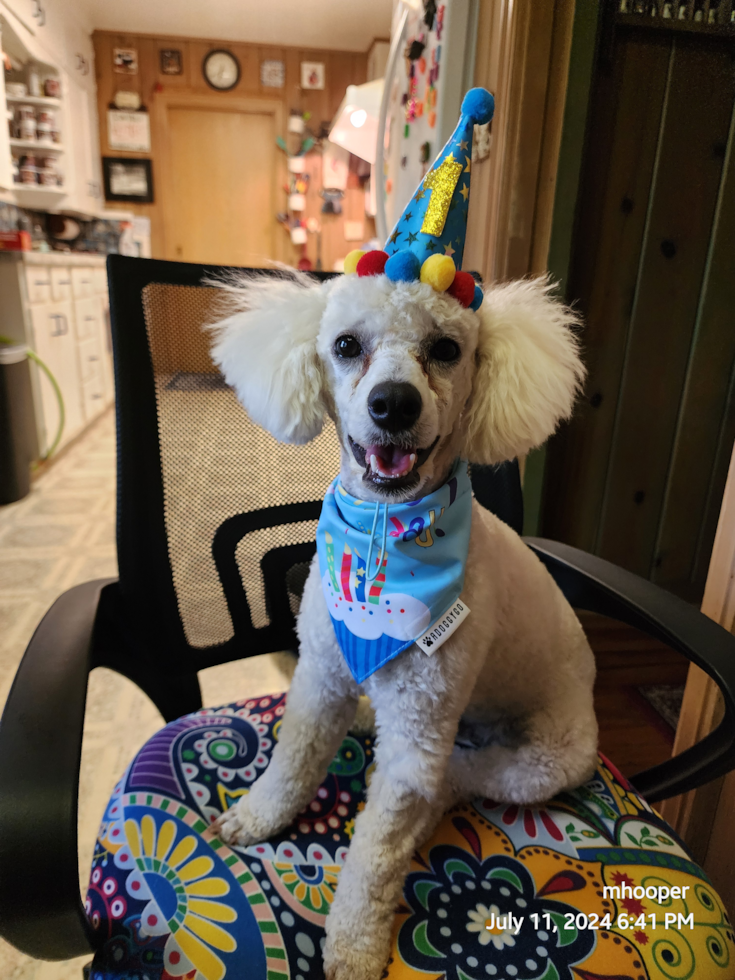Poodle Breed Information


Beloved worldwide for their elegance, intelligence, and distinctive coat, Miniature and Toy Poodles embody the perfect blend of beauty and brains. Falling under the broader Poodle breed umbrella, these smaller versions carry the same charm, intelligence, and class, but in a petite, more manageable package. Miniature and Toy Poodles are well-suited to a variety of living environments, making them excellent companions for families, seniors, and city dwellers alike.
Miniature Poodles, being slightly larger than their Toy counterparts, stand at around 10 to 15 inches at the shoulder, while Toy Poodles are even more diminutive, measuring up to 10 inches. Despite their small size, both Miniature and Toy Poodles carry themselves with an air of dignity and pride that's truly captivating.
Renowned for their superior intelligence and exceptional trainability, these breeds excel in various dog sports, including agility, obedience, and tracking. Their curly, hypoallergenic coats, available in an array of colors, add to their appeal, but do require regular grooming to keep them looking their best.
Beneath their sophisticated exterior, Miniature and Toy Poodles are affectionate, playful, and thrive on human companionship. They form strong bonds with their families, and their sensitivity to people's moods makes them excellent therapy dogs. However, they're not just lap dogs; these Poodles are energetic, athletic dogs who need regular physical and mental stimulation to keep them happy and healthy.
Characteristics
- Intelligence: Miniature and Toy Poodles are renowned for their impressive intellect, often ranking among the most intelligent of dog breeds. This intelligence makes them highly trainable and quick to pick up new commands, tricks, and tasks.
- Active: Despite their small size, these Poodles are quite active. They require regular physical exercise and mental stimulation to keep their minds sharp and bodies healthy. Their agile nature also makes them excellent candidates for dog sports.
- Adaptable: Miniature and Toy Poodles are highly adaptable dogs. They're equally comfortable living in an apartment in the city as they are in a house with a big backyard. As long as they're getting plenty of exercise and attention, they can thrive in many living situations.
- Friendly: Known for their friendly and sociable nature, these Poodles make excellent companions. They enjoy being around their human families and are usually good with other pets and well-behaved children.
- Hypoallergenic: Thanks to their curly, dense coats, Miniature and Toy Poodles are often recommended for people with allergies. They're low-shedding breeds, which means they produce fewer allergens than many other breeds.
- Longevity: These Poodles are blessed with a long lifespan, often living between 12 to 15 years, and sometimes even longer. With proper care, they can provide many years of companionship.
- Elegance: There's no denying the elegance of a Poodle, regardless of its size. The breed's distinctive haircut, proud carriage, and graceful demeanor make the Miniature and Toy varieties real head-turners wherever they go.

Appearance
Miniature and Toy Poodles present a vision of canine elegance and charm with their distinctive curly coats and proud bearing. Despite the size difference, both Miniature and Toy Poodles share the same overall breed characteristics of a standard Poodle, showcasing the breed's classic looks in a smaller, more compact form.
Miniature Poodles stand 10 to 15 inches at the shoulder and generally weigh between 10 to 15 pounds, while Toy Poodles, even more petite, measure 10 inches or less and weigh 4 to 6 pounds. Yet, despite their smaller size, both breeds retain the square-built, proportionate body of the standard Poodle, giving them an athletic, well-balanced look.
The hallmark of these breeds is, of course, their distinctive coat. They are covered in dense, curly fur that is both hypoallergenic and non-shedding. The coat comes in a variety of colors, including black, white, apricot, cream, blue, and silver, among others, providing a wonderful array of options for Poodle enthusiasts.
The eyes of the Miniature and Toy Poodles are dark and oval-shaped, expressing an alert and intelligent gaze. They have long, straight ears that hang close to the head. The breed's muzzle is straight and long, lending an air of sophistication to their overall appearance.
Miniature and Toy Poodles are also recognized for their unique haircuts, originally designed to protect their joints and organs from cold waters while not impeding their swimming abilities. Today, these stylized clips, such as the Continental and English Saddle, contribute to the breed's reputation for elegance and refinement.
Photos
Temperament
Miniature and Toy Poodles carry a delightful mix of intelligence, affection, and a dash of cheeky charm in their personalities. Their endearing temperament, coupled with their adaptability, has made them loved companions across the globe.
Highly intelligent and eager to please, both Miniature and Toy Poodles are quick learners, which makes them excel in obedience and agility training. Their mental agility is matched by an innate curiosity, making them engaged observers of their environment and keen participants in interactive play and problem-solving games.
Miniature and Toy Poodles are also known for their deeply affectionate nature. They form strong bonds with their human families, thriving on attention and interaction. These breeds are happiest when they are part of their family's daily activities, whether that involves a game of fetch in the yard, a walk in the park, or simply curling up next to you on the couch.
Despite their petite size, both Miniature and Toy Poodles can be surprisingly bold and confident. They carry themselves with an air of dignity, and while they are generally friendly and sociable, they can also exhibit a discerning nature around strangers.
However, it's important to remember that like any breed, temperament can be influenced by a multitude of factors, including heredity, training, and socialization. Early exposure to different people, sights, sounds, and experiences can ensure your Miniature or Toy Poodle grows into a well-rounded, sociable dog.
Care
Grooming
While the Miniature and Toy Poodles' unique coats are undeniably beautiful, maintaining their distinctive curls does require a commitment to regular grooming. This commitment ensures your Poodle not only looks their best but also stays healthy and comfortable.
Their curly, hypoallergenic coats need regular brushing, ideally every other day, to prevent matting and tangles. Using a slicker brush or a comb with both wide and narrow teeth can help keep your Poodle's coat in tip-top condition.
These smaller Poodles also require regular professional grooming. Due to their fast-growing hair, they typically need a trim every 6 to 8 weeks. There are many different styles you can choose from, including the 'puppy' clip, 'continental' clip, or 'English saddle' clip. Each of these styles is designed to accentuate the Poodle's elegance while maintaining the practical purposes of the coat.
In addition to coat care, regular dental hygiene is vital. Brushing their teeth several times a week can help prevent tartar buildup and gum disease. Regular nail trims are also necessary to keep their feet in good condition and prevent overgrowth, which can lead to discomfort and issues with walking.
Ear care is particularly important for Miniature and Toy Poodles, as their floppy ears can create a warm, moist environment that's ideal for infection. Regular checks and gentle cleaning can help prevent any issues.
Despite the grooming needs, many owners find the routine a wonderful opportunity to bond with their Miniature or Toy Poodle. With proper care, these breeds' iconic curly coats will continue to turn heads and embody the classic elegance and charm that Poodles are known for.
Exercise Needs
Miniature and Toy Poodles, despite their smaller stature, are active dogs that require regular exercise to keep them healthy, happy, and well-behaved. Their spirited, intelligent nature means they enjoy both physical and mental stimulation, making them excellent companions for various activities.
Daily walks are a must for these breeds. Regular strolls around the neighborhood, parks, or trails not only provide them with physical exercise but also offer them the opportunity to explore their environment, keeping their keen minds engaged.
In addition to walking, Miniature and Toy Poodles often excel at dog sports such as agility, obedience, and rally. These activities can provide both physical exertion and mental stimulation, making them a great choice for this intelligent and agile breed. Participating in such activities can also strengthen the bond between you and your Poodle and can be a source of mutual enjoyment.
Interactive play sessions, be it a game of fetch or a puzzle toy, can also provide both exercise and mental engagement for these active breeds. They are also excellent swimmers, a testament to their water retriever heritage, and many enjoy a splash in a safe body of water.
However, it's essential to remember that while they are active and energetic, Miniature and Toy Poodles are also small breeds, so their exercise needs can be met with less intense activities compared to larger breeds.
The key to exercising a Miniature or Toy Poodle is variety and consistency. Regular exercise helps maintain their physical health, supports mental well-being, and reduces the likelihood of developing problem behaviors.
Health
While Miniature and Toy Poodles are generally healthy breeds, like all dogs, they may be prone to certain breed-specific health conditions. However, with proper care, regular veterinary check-ups, and a healthy lifestyle, these Poodles can lead full, happy lives.
Miniature and Toy Poodles can also be prone to dental issues due to their smaller mouths. Regular teeth cleaning and professional dental care can help maintain their dental health.
Lastly, like many smaller breeds, Miniature and Toy Poodles may be more susceptible to obesity. Regular exercise and portion control are crucial to keep them at a healthy weight.
Not all Miniature and Toy Poodles will get any or all of these diseases, but it's essential to be aware of them if you're considering this breed. Regular check-ups with a vet can ensure early detection and management of these health issues, allowing your Poodle to live a healthy, happy life.
Lifespan
Miniature and Toy Poodles are blessed with a long lifespan compared to many other breeds, allowing for many wonderful years of companionship. With proper care, a balanced diet, regular exercise, and routine veterinary check-ups, these breeds typically live between 12 to 15 years. There are even instances of Poodles living into their late teens or early twenties.
The key to a long, healthy life for your Poodle involves several factors. Nutrition is paramount – feeding your Poodle high-quality dog food appropriate for their age, size, and health status can contribute significantly to their overall well-being. Portion control is also important to prevent obesity, which can lead to various health issues.
Regular exercise is vital to maintaining a healthy weight and promoting cardiovascular health. Additionally, mental stimulation, through play, training, and social interaction, can contribute to their overall quality of life.
Regular veterinary check-ups are essential to catch any potential health issues early and to ensure your Poodle is up to date with vaccinations and preventative care. Dental care, both at home and professional, can prevent dental disease, which is common in smaller breeds.
One remarkable example is a Toy Poodle named 'Chichi,' who lived to be 24 years old, setting a record as one of the longest-lived dogs in history. While not every Poodle can reach such an impressive age, these breeds are known for their longevity.
Training
Training a Miniature or Toy Poodle is often a rewarding experience, as these breeds are renowned for their intelligence and eagerness to please. Their high level of trainability makes them excellent candidates for various dog sports, including agility, obedience, and rally.
Starting training early is key for these breeds. Puppy classes can be a great way to kickstart their training journey, offering both socialization and basic obedience skills. Socializing your Poodle from a young age will help them grow into a well-rounded, confident adult.
Miniature and Toy Poodles respond best to positive reinforcement training methods. Praise, treats, and toys can be effective motivators, turning training sessions into a game that your Poodle will look forward to. Avoid harsh training methods, as they can be counterproductive and damage the bond between you and your Poodle.
Due to their intelligence, these Poodles need mental stimulation as much as they need physical exercise. Training sessions, puzzle toys, and interactive games can help keep their minds sharp. Regular training can also prevent behavioral issues and strengthen the bond between you and your Poodle.
Despite their smaller size, Miniature and Toy Poodles can benefit from learning a range of commands, from basic obedience to more advanced tricks. Due to their agility and intelligence, many excel in dog sports, further testament to their trainable nature.
Consistency is key in training. With patience, positive reinforcement, and a consistent approach, your Miniature or Toy Poodle will not only be well-behaved but also a joy to live with.
History
Though often associated with luxury and sophistication, Poodles, including Miniature and Toy varieties, have a history that extends beyond the glamour. Despite the breed's current reputation as a paragon of French elegance, the Poodle actually originated in Germany as a water retriever. The name "Poodle" comes from the German word "Pudel," meaning "to splash," reflecting the breed's early aquatic beginnings.
The Poodle's distinctive coat served a practical purpose, with the unique clipping patterns providing protection against cold water while ensuring the dogs retained their agility. Over time, the breed's intelligence, athleticism, and striking good looks caught the attention of the French, who embraced the breed and eventually declared it their national dog.
The Miniature and Toy Poodles were developed a bit later, with breeders aiming to create smaller versions of the standard Poodle that maintained the breed's characteristic traits but in a more compact size. Miniature Poodles were likely developed in the early 1400s by breeding small standard Poodles, and Toy Poodles came even later, probably in the 18th century.
Both Miniature and Toy Poodles quickly found favor among nobles and royalty, and they were particularly popular in the court of Louis XVI. The breeds' popularity continued to grow, and by the mid-20th century, Poodles, including the smaller versions, had become one of the most popular breeds in the United States.
Despite their shift from working dogs to pampered pets, Miniature and Toy Poodles have retained their intelligence, athleticism, and dignified bearing. Today, these breeds are beloved family pets known for their intelligence, trainability, and affectionate nature, continuing to charm people worldwide with their unique combination of elegance and exuberance.









